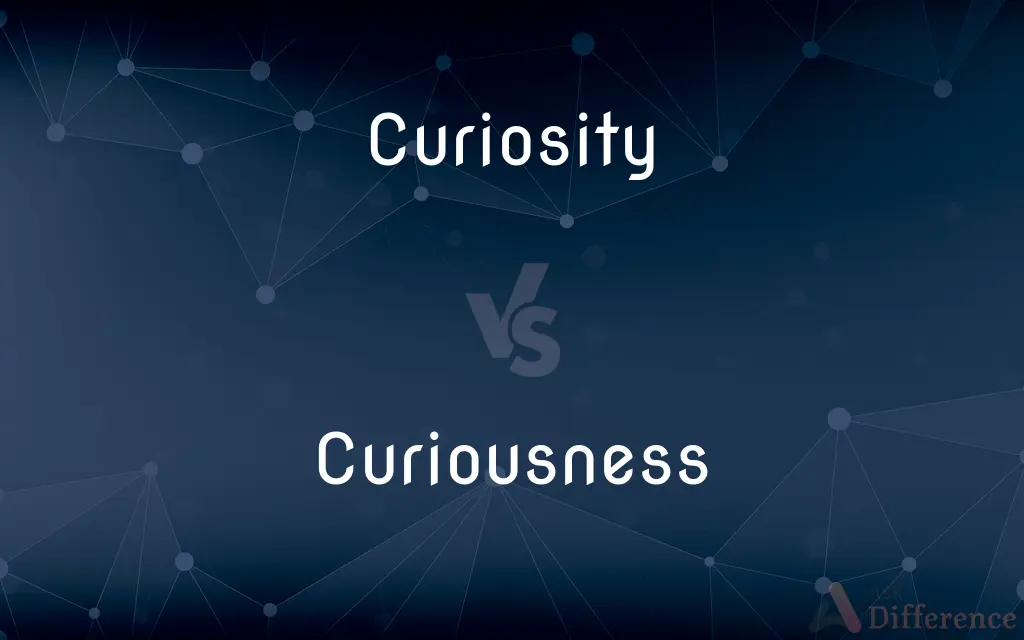Curiosity vs. Curiousness — What's the Difference?
By Urooj Arif & Fiza Rafique — Updated on April 6, 2024
Curiosity is the desire to learn or know about anything, while curiousness refers more to the quality or state of being curious.

Difference Between Curiosity and Curiousness
Table of Contents
ADVERTISEMENT
Key Differences
Curiosity often implies an active, engaging desire to learn, discover, or explore new information, ideas, or places. It is considered a fundamental driving force behind human learning and innovation, encompassing a broad and dynamic range of interests. On the other hand, curiousness is more specifically the state or quality of being curious—indicating the trait or characteristic of a person or their manner of showing interest or inquiry.
While curiosity can manifest as a powerful motivator that propels individuals towards investigation and learning, curiousness tends to describe the general disposition or tendency to exhibit curiosity in various situations. For example, a scientist driven by curiosity might embark on a complex research project, whereas a person described as having curiousness might simply enjoy pondering over puzzles or engaging in casual exploration of different subjects.
The nuance between curiosity and curiousness also lies in their contextual usage. Curiosity is often used to describe both a psychological trait and the resulting behavior of seeking knowledge and understanding, thereby holding a slightly more active and dynamic connotation. Curiousness, while closely related, sometimes carries a more passive implication, focusing on the inclination or capacity to be curious.
In educational and psychological discussions, curiosity is frequently analyzed as a critical component of cognitive development and engagement with the world. It is associated with positive outcomes in learning, creativity, and problem-solving. Curiousness, while also valued, is less commonly the focus of scholarly discourse and is more often used in everyday language to describe a person's habitual inquisitiveness.
Despite their differences, both curiosity and curiousness are viewed positively in most cultural and intellectual contexts. They are considered essential for personal growth, understanding diverse perspectives, and fostering innovation. The distinction, though subtle, highlights different aspects of the inclination towards inquiry and discovery.
ADVERTISEMENT
Comparison Chart
Definition
The desire to learn or know about anything; inquisitiveness.
The quality or state of being curious.
Connotation
Active and dynamic; implies a motivating desire.
More passive; indicates a trait or characteristic.
Context
Used broadly in educational, psychological, and general contexts.
Often used to describe personal dispositions or tendencies.
Implication
Implies an engaging process of exploration and discovery.
Describes a general inclination towards being curious.
Usage
Focuses on the behavior and psychological trait of seeking knowledge.
More about the inherent quality of showing interest or inquiry.
Compare with Definitions
Curiosity
An innate desire to explore and understand the world.
Her curiosity led her to travel to remote corners of the earth.
Curiousness
The tendency to be easily interested or fascinated.
His curiousness about cultures makes him an avid reader of history.
Curiosity
A motivating factor in learning and innovation.
Curiosity drives scientific discovery and technological advancement.
Curiousness
A quality observed in inquisitive personalities.
Her curiousness makes her a keen observer of human behavior.
Curiosity
Fundamental to cognitive and emotional development.
Encouraging curiosity in students enhances their educational outcomes.
Curiousness
Reflects an open-minded attitude.
Curiousness about different viewpoints enhances empathy and understanding.
Curiosity
Can lead to greater creativity and problem-solving.
Curiosity often precedes creative breakthroughs in art and science.
Curiousness
Can describe a fleeting or mild interest.
His curiousness about the subject waned after taking the introductory course.
Curiosity
Encourages questioning and investigation.
A child's curiosity about nature fosters early learning.
Curiousness
Sometimes implies an unusual or unexpected interest.
The cat's curiousness about the new visitor was amusing to watch.
Curiosity
Curiosity (from Latin cūriōsitās, from cūriōsus "careful, diligent, curious", akin to cura "care") is a quality related to inquisitive thinking such as exploration, investigation, and learning, evident by observation in humans and other animals. Curiosity is heavily associated with all aspects of human development, in which derives the process of learning and desire to acquire knowledge and skill.The term curiosity can also be used to denote the behavior or emotion of being curious, in regard to the desire to gain knowledge or information.
Curiousness
Eager to learn more
Curious investigators.
A trapdoor that made me curious.
Curiosity
A strong desire to know or learn something
Curiosity got the better of me, so I called him
Filled with curiosity, she peered through the window
Curiousness
Unduly inquisitive; prying
A curious neighbor always looking over the fence.
Curiosity
An unusual or interesting object or fact
He showed them some of the curiosities of the house
Curiousness
Arousing interest because of novelty or strangeness
A curious fact.
Curiosity
A desire to know or learn.
Curiousness
Accomplished with skill or ingenuity.
Curiosity
A desire to know about people or things that do not concern one; nosiness.
Curiousness
Extremely careful; scrupulous or fastidious.
Curiosity
An object that arouses interest, as by being novel or extraordinary
Kept the carved bone and displayed it as a curiosity.
Curiousness
(uncountable)
Curiosity
A strange or odd aspect.
Curiousness
Curiosity; inquisitiveness.
Curiosity
(Archaic) Fastidiousness.
Curiousness
(dated) The state of being curious; exactness of workmanship; ingenuity of contrivance.
Curiosity
Inquisitiveness; the tendency to ask and learn about things by asking questions, investigating, or exploring.
Curiousness
(obsolete) Care; carefulness; pains.
Curiosity
A unique or extraordinary object which arouses interest.
He put the strangely shaped rock in his curiosity cabinet.
Curiousness
(countable) The product or result of being curious.
Curiosity
(obsolete) Careful, delicate construction; fine workmanship, delicacy of building.
Curiousness
Carefulness; painstaking.
My father's careWith curiousness and cost did train me up.
Curiosity
The state or quality or being curious; nicety; accuracy; exactness; elaboration.
When thou wast in thy gilt and thy perfume, they mocked thee for too much curiosity.
A screen accurately cut in tapiary work . . . with great curiosity.
Curiousness
The state of being curious; exactness of workmanship; ingenuity of contrivance.
Curiosity
Disposition to inquire, investigate, or seek after knowledge; a desire to gratify the mind with new information or objects of interest; inquisitiveness.
Curiousness
Inquisitiveness; curiosity.
Curiosity
That which is curious, or fitted to excite or reward attention.
We took a ramble together to see the curiosities of this great town.
There hath been practiced also a curiosity, to set a tree upon the north side of a wall, and, at a little hieght, to draw it through the wall, etc.
Curiousness
A state of active curiosity
Curiosity
A state in which you want to learn more about something
Curiousness
The quality of being alien or not native;
The strangeness of a foreigner
Curiosity
Something unusual -- perhaps worthy of collecting
Common Curiosities
How can educators foster curiosity and curiousness in students?
By creating stimulating learning environments, encouraging questions, and connecting subjects to students' interests.
How do curiosity and curiousness impact learning?
Both positively impact learning by motivating individuals to seek knowledge, ask questions, and engage with new ideas.
Do curiosity and curiousness vary across cultures?
Cultural norms can influence how curiosity and curiousness are expressed and encouraged, though they are universal traits.
Can curiousness be developed into a stronger curiosity?
Yes, with encouragement and exposure to new experiences, curiousness can deepen into a more active curiosity.
Can too much curiousness be a distraction?
Excessive curiousness without focus can lead to scattered attention and difficulty completing tasks, highlighting the need for balance.
Is curiosity a learned behavior or an innate trait?
Curiosity is considered both an innate human trait and a behavior that can be nurtured and developed over time.
Is there a negative side to curiosity or curiousness?
While generally positive, excessive curiosity without boundaries can lead to privacy invasion or risky behaviors.
Can a lack of curiousness be harmful?
A lack of curiousness may limit personal growth, understanding, and the ability to innovate or solve problems creatively.
Are there professions where curiosity or curiousness is particularly important?
Fields such as science, education, journalism, and art greatly benefit from high levels of curiosity and curiousness.
How do you measure curiosity or curiousness?
While challenging to quantify, assessments often look at behaviors such as exploration, question-asking, and engagement with novel stimuli.
Can animals exhibit curiosity or curiousness?
Many animals show behaviors indicative of curiosity or curiousness, especially when exploring their environment or interacting with new objects.
How do curiosity and curiousness benefit society?
They drive innovation, cultural understanding, and the continuous pursuit of knowledge, contributing to societal progress.
How do curiosity and curiousness relate to creativity?
Both are closely linked to creativity, as they involve exploring possibilities and combining ideas in novel ways.
How do technology and the internet affect curiosity and curiousness?
They provide unprecedented access to information, potentially enhancing curiosity but also requiring discernment to navigate effectively.
Is there a difference in how curiosity and curiousness are perceived in children vs. adults?
Children are often more openly curious, while adults may have more focused interests or inquiries, though both are valued for lifelong learning.
Share Your Discovery

Previous Comparison
Abrod vs. Abord
Next Comparison
Superannuation vs. PensionAuthor Spotlight
Written by
Urooj ArifUrooj is a skilled content writer at Ask Difference, known for her exceptional ability to simplify complex topics into engaging and informative content. With a passion for research and a flair for clear, concise writing, she consistently delivers articles that resonate with our diverse audience.
Co-written by
Fiza RafiqueFiza Rafique is a skilled content writer at AskDifference.com, where she meticulously refines and enhances written pieces. Drawing from her vast editorial expertise, Fiza ensures clarity, accuracy, and precision in every article. Passionate about language, she continually seeks to elevate the quality of content for readers worldwide.














































